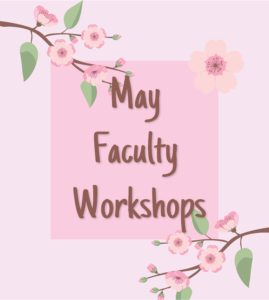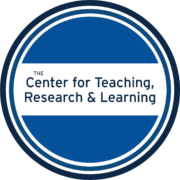2021 May Faculty Workshops Session Archive
Session Dates

Thursday, May 13
AU Core: Developing a Complex Problems Seminar
9:15am – 10:45am
Are you curious about proposing a Complex Problems Seminar? Have you had a CP proposal approved and want some ideas for how to turn it into a full course? Have you been teaching a CP Seminar and want to jazz it up? In this workshop, CP Program faculty and staff will help participants with any of these interests. Regardless of which stage applies, participants should bring drafts of the appropriate materials, and they’ll leave ready to tackle the next steps.
AU Core: University College Faculty Cohort Collaboration
11:00am – 12:30pm
In this session, faculty teaching in the Fall 2021 University College living-learning community will work with their themed cohorts to solidify plans that impact course preparation and syllabus creation. Cohorts will also make cohort-based co-curricular plans and identify information that can potentially be shared with incoming students following UC confirmations.
AU Core: Demystifying the DIV: Unpacking and Implementing the Diversity and Equity Learning Outcomes of the AU Core
1:00pm – 2:30pm
This workshop will help participants who are (a) wondering how they could align their courses with Diversity and Equity learning outcomes or (b) seeking examples of what they can do in their DIV classes. Facilitators and participants will share examples of content and assignments from different disciplines that highlight DIV elements. They will also discuss how courses that are not typically seen as DIV candidates could be infused with those elements. Participants will practice creating a DIV course proposal using their own syllabi or a provided sample.
AU Core: The Goldilocks Approach: Responding to Student Writing Enough and Not Too Much
2:45pm – 4:15pm
This workshop will present approaches to responding to student writing in ways that foster transfer and self-sufficiency. Participants will be invited to talk about their own (discipline-specific, perhaps) approaches to giving feedback. Time will be given for discussion of commenting on mechanics and formatting. The workshop will be grounded in Writing Studies theories and in the importance of transfer. This workshop is open to all faculty, whether or not they teach W2 courses.
Friday, May 14
Being a Part of DC, Not Apart from DC: A Community-Based Learning Faculty Workshop (Part 1)
10:00am – 12:00pm
This session focuses on (re)designing a course syllabus to incorporate Community-Based Learning & Research (CBLR), a pedagogy that deepens student learning through collaboration with a nonprofit or school in the DC area. This “high impact practice” advances AU’s Strategic Plan and helps students better understand issues that impact local residents and organizations. Participants will discuss best practices and challenges for collaboration with community partners, compare direct service, project-based work, and community-based research, and explore ways to incorporate critical thinking and reflection.
MIS_ING DAT_: Ways to Identify Types of Missingness and Strategies to Handle Them in R
1:00pm – 3:30pm
Try as hard as we might, missing data happens…In this session, we will talk about the types of missingness, ways to inspect missingness, and both traditional and modern approaches to handle missing data (as well as the strengths and weaknesses of each). Then we will move over to R and go over code and ways to assess and handle missingness.
Saturday, May 15
Student Engagement in Synchronous Class Sessions
9:30am – 10:30am
Ample research cites the importance of engaging students to optimize learning. This workshop will discuss and implement instructional strategies that you can use to keep your students engaged in a synchronous session.
By attending this workshop, participants will be able to:
a) Define engagement and describe strategies to evaluate engagement in the synchronous class environment
b) Select tools best suited for your course learning outcomes that offer maximum student engagement
Canvas Overview
10:40am – 11:40am
This workshop is designed to introduce Canvas to those who have never used it before. This 1-hour workshop will provide a high-level overview of basic functionality within Canvas. It will cover Global Navigation, profile settings, Inbox communication, Course set up, Help/Resources, and the overall Canvas Interface.
By attending this workshop, participants will be able to:
a) Navigate Canvas
b) Create your first assignments, quizzes, pages, and publish your course
c) Effectively communicate with students in Canvas
Kaltura Within Canvas
11:50am – 12:50pm
This session introduces you to the video creation and streaming software Kaltura and Kaltura Capture and will prepare you to record mini-lectures, video feedback, weekly summaries, presentations, and more. You will learn the technical aspects of the software and how to effectively integrate this technology into your class and how to use it as a teaching tool.
By attending this workshop, participants will be able to:
a) Add media into Kaltura
b) Embed and display videos in your Canvas course
c) Use Video Quizzes and effectively incorporate mixed media in your course.
Zoom Within Canvas
1:20pm – 2:20pm
Zoom in Canvas allows you to virtually collaborate with your students in class sessions, office hours, meetings, and group projects. There are several ways to integrate Zoom into your Canvas course to make facilitating meetings seamless. In this workshop, we will go over the different settings when creating a zoom meeting, how to create breakout rooms and Zoom best practices.
By attending this workshop, participants will be able to:
a) Set up a reoccurring Zoom session in Canvas
b) Create Breakout rooms for Zoom
c) Create Virtual Office Hours using Zoom
Monday, May 17
Teaching Portfolio Part 1 of N: Writing a Teaching Philosophy
9:30am – 12:30pm
With the recent changes made by the Faculty Senate regarding the assessment of teaching at American University, there are now many ways to demonstrate your teaching excellence, including through a teaching portfolio. A critical component of the portfolio is the teaching philosophy. A teaching philosophy provides you with an opportunity to convey your teaching values and express how those values inform your instructional practices. In this workshop, we will introduce the basic components of a teaching philosophy statement and guide you through the process of conceptualizing and articulating your priorities and goals as an instructor.
Being a Part of DC, Not Apart from DC: A Community-Based Learning Faculty Workshop (Part 2)
1:00pm – 3:00pm
This session focuses on (re)designing a course syllabus to incorporate Community-Based Learning & Research (CBLR), a pedagogy that deepens student learning through collaboration with a nonprofit or school in the DC area. This “high impact practice” advances AU’s Strategic Plan and helps students better understand issues that impact local residents and organizations. Participants will discuss best practices and challenges for collaboration with community partners, compare direct services, project-based work, and community-based research, and explore ways to incorporate critical thinking and reflection
Tuesday, May 18
Critical Conversations with the Inclusive Pedagogy (IP) Fellows
9:30am – 12:30pm
Now more than ever it is imperative for faculty to engage in critical conversations that will lead to equitable, inclusive or expansive, antiracist actionable outcomes in our research, teaching, and service. This workshop will offer participants an opportunity to learn more about CTRL’s Inclusive Pedagogy (IP) Faculty Fellows Program and gather insights into the ways that the current IP fellows foreground equity, inclusion, and antiracism in their work. In this session, attendees will have space to reflect on their teaching praxis while strengthening their commitments to student success and belonging.
No recording available.
Antiracist Curriculum Development: Lessons from the School of Education and the College of Arts and Sciences
1:00pm – 2:30pm
Faculty and deans from CAS and SOE describe their experiences with fostering antiracist pedagogy and course content. While antiracist curriculum development serves the goals of advancing diversity, equity, and inclusion (DEI), it goes beyond a diversity paradigm to challenge structures of systemic racism, antiblackness, and white supremacy in society and in our academic disciplines. Antiracist curriculum and pedagogy also affirm the lived experiences and cultures of Black and Brown students and elevate voices of BIPOC scholarship. We will discuss useful concepts and approaches, how antiracist teaching and curriculum development work in different disciplines, and forms of support for faculty engaging in this practice. We will also address the inherent challenges and tensions that may arise doing this work and ways to work through them.

